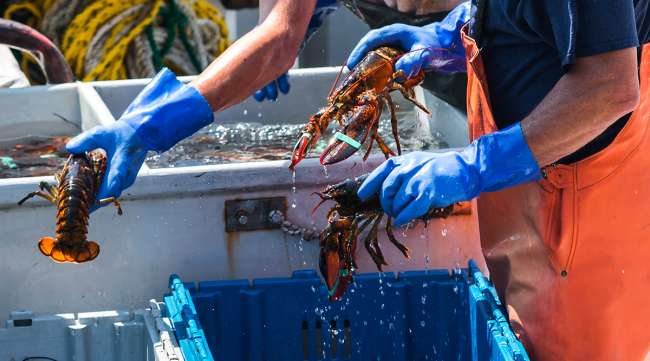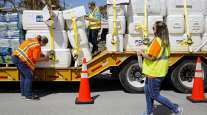Staff Reporter
Maine Lawmakers Petition FMCSA Regarding Lobster Transport

[Stay on top of transportation news: Get TTNews in your inbox.]
In an effort to ease the commercial transport of lobster, a group of Maine lawmakers submitted a request to federal government officials asking to clarify the definition of “livestock” in a recently issued interim final rule.
The quartet of legislators, made up of Sens. Susan Collins and Angus King and Reps. Chellie Pingree and Jared Golden, submitted the letter of request to Transportation Secretary Elaine Chao and Federal Motor Carrier Safety Administration Deputy Administrator Wiley Deck on Jan. 4.
The letter was submitted in the wake of an interim final rule FMCSA released Nov. 19 that clarified “any agricultural commodity,” “nonprocessed food” and “livestock,” each of which is included in the definition of “agricultural commodity.” Agricultural products are considered in federal hours-of-service regulations, as many such goods travel by truck.
Letter to Elaine Chao and Wiley Deck by Transport Topics on Scribd
In the interim final rule, the agency interpreted “livestock” as all living animals and insects “cultivated, grown or raised for commercial purposes, including aquatic animals.”
This interpretation built on a definition that already included cattle, elk, reindeer, bison, horses, deer, sheep, goats, swine, poultry, llamas, alpacas, live fish, crawfish and other animals that are part of a foundation herd or offspring.
According to their letter, the Maine lawmakers asked that the definition be amended to include all living animals and insects “cultivated, grown, raised, caught or harvested for commercial purposes, including aquatic animals.”

Home | Video | Heroes' Photo Gallery
Saluting the men and women of the trucking industry who kept America's essential goods flowing during the coronavirus pandemic.
Heroes: Peter Lacoste | Susan Dawson | James Rogers | Reggie Barrows | Kevin Cooper | Cesar Quintana Moreno
“This clarifying language will ensure that lobster and other shellfish from Maine can be included under limited, long-standing agricultural exemptions to the hours-of-service rules,” the letter states.
Currently, during harvesting and planting seasons that are determined by each state, drivers transporting agricultural commodities are exempt from HOS requirements while traveling from the source of the commodities to a location within a 150 air-mile radius of the source. Furthermore, drivers transporting livestock in interstate commerce are exempt from the 30-minute rest break rule while the livestock are contained in the commercial motor vehicle.
Lobster represents an important aspect of Maine’s economy. According to the Maine Lobstering Union, harvesters in the state landed 101.7 million pounds in 2019, a haul valued at $485.4 million.
The legislators’ letter indicates the coronavirus pandemic has presented challenges for the industry.

In this year in review episode, we discuss COVID and everything from gas tax to remote work. With the help of our special Transport Topics guests, Seth Clevenger and Eleanor Lamb, we’ll also begin to map a plan for 2021. Hear a snippet, above, and get the full program by going to RoadSigns.TTNews.com.
“With exports to foreign markets falling precipitously over the last several years due to retaliatory tariffs and the impact of COVID-19 on Maine’s tourism and hospitality industries, it has become increasingly important that Maine lobster can reach key domestic markets, such as nearby Boston, in a timely manner,” the letter states.
FMCSA’s interim final rule took effect Dec. 9, and the agency accepted public comments on it through Dec. 24. FMCSA will consider and address these comments in the final rule that will follow the interim final rule, and may make changes in response to the comments.
Similar to the lawmakers’ letter, the Maine Lobstering Union’s formal comment to FMCSA recommended the addition of “caught” and “harvested” to the definition of livestock.
“Maine is known worldwide for its seafood, specifically lobster; it is the economic backbone of our coastal communities,” the Maine Lobstering Union stated in its comment. “Our live lobsters require special care from us and our drivers. It is for this reason we feel so strongly that lobster should also be listed under the agricultural exemption.”
Want more news? Listen to today's daily briefing:
Subscribe: Apple Podcasts | Spotify | Amazon Alexa | Google Assistant | More




